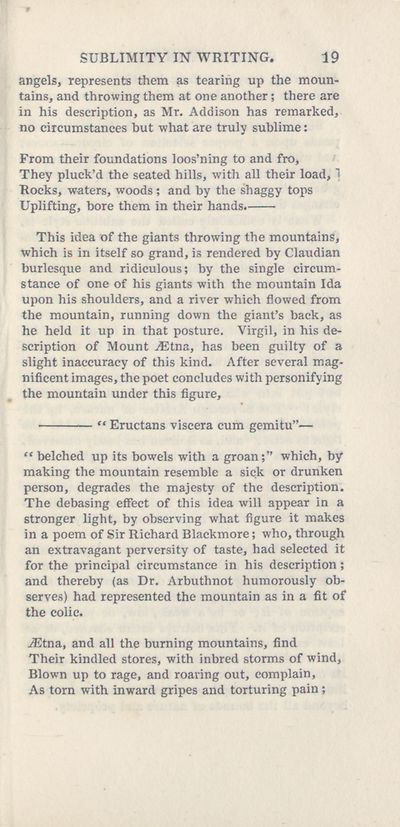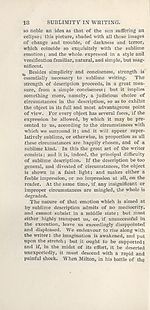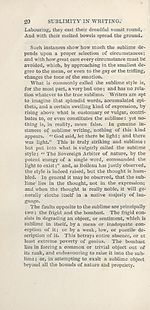Education > Essays on rhetoric
(47)
Download files
Complete book:
Individual page:
Thumbnail gallery: Grid view | List view

SUBLIMITY IN WRITING. 19
angels, represents them as tearing up the moun¬
tains, and throwing them at one another; there are
in his description, as Mr. Addison has remarked,
no circumstances but what are truly sublime:
From their foundations loos’ning to and fro,
They pluck’d the seated hills, with all their load, 1
Rocks, waters, woods; and by the shaggy tops
Uplifting, bore them in their hands.
This idea of the giants throwing the mountains,
which is in itself so grand, is rendered by Claudian
burlesque and ridiculous; by the single circum¬
stance of one of his giants with the mountain Ida
upon his shoulders, and a river which flowed from
the mountain, running down the giant’s back, as
he held it up in that posture. Virgil, in his de¬
scription of Mount .flCtna, has been guilty of a
slight inaccuracy of this kind. After several mag¬
nificent images, the poet concludes with personifying
the mountain under this figure,
“ Eructans viscera cum gemitu”—
“ belched up its bowels with a groan;” which, by
making the mountain resemble a sick or drunken
person, degrades the majesty of the description.
The debasing effect of this idea will appear in a
stronger light, by observing what figure it makes
in a poem of Sir Richard Blackmore; who, through
an extravagant perversity of taste, had selected it
for the principal circumstance in his description;
and thereby (as Dr. Arbuthnot humorously ob¬
serves) had represented the mountain as in a fit of
the colic.
./Etna, and all the burning mountains, find
Their kindled stores, with inbred storms of wind,
Blown up to rage, and roaring out, complain.
As torn with inward gripes and torturing pain;
angels, represents them as tearing up the moun¬
tains, and throwing them at one another; there are
in his description, as Mr. Addison has remarked,
no circumstances but what are truly sublime:
From their foundations loos’ning to and fro,
They pluck’d the seated hills, with all their load, 1
Rocks, waters, woods; and by the shaggy tops
Uplifting, bore them in their hands.
This idea of the giants throwing the mountains,
which is in itself so grand, is rendered by Claudian
burlesque and ridiculous; by the single circum¬
stance of one of his giants with the mountain Ida
upon his shoulders, and a river which flowed from
the mountain, running down the giant’s back, as
he held it up in that posture. Virgil, in his de¬
scription of Mount .flCtna, has been guilty of a
slight inaccuracy of this kind. After several mag¬
nificent images, the poet concludes with personifying
the mountain under this figure,
“ Eructans viscera cum gemitu”—
“ belched up its bowels with a groan;” which, by
making the mountain resemble a sick or drunken
person, degrades the majesty of the description.
The debasing effect of this idea will appear in a
stronger light, by observing what figure it makes
in a poem of Sir Richard Blackmore; who, through
an extravagant perversity of taste, had selected it
for the principal circumstance in his description;
and thereby (as Dr. Arbuthnot humorously ob¬
serves) had represented the mountain as in a fit of
the colic.
./Etna, and all the burning mountains, find
Their kindled stores, with inbred storms of wind,
Blown up to rage, and roaring out, complain.
As torn with inward gripes and torturing pain;
Set display mode to:
![]() Universal Viewer |
Universal Viewer | ![]() Mirador |
Large image | Transcription
Mirador |
Large image | Transcription
| Antiquarian books of Scotland > Education > Essays on rhetoric > (47) |
|---|
| Permanent URL | https://digital.nls.uk/113760056 |
|---|
| Description | Thousands of printed books from the Antiquarian Books of Scotland collection which dates from 1641 to the 1980s. The collection consists of 14,800 books which were published in Scotland or have a Scottish connection, e.g. through the author, printer or owner. Subjects covered include sport, education, diseases, adventure, occupations, Jacobites, politics and religion. Among the 29 languages represented are English, Gaelic, Italian, French, Russian and Swedish. |
|---|

